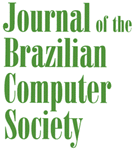Resumo em Inglês:
In Educational literature, Discovery Learning appears as an approach in which the learner builds up his/her own knowledge by performing experiments within a domain and inferring/increasing rules as a result. Such a constructivist approach has been largely exploited in the design of computational artefacts with learning purposes, the so-called Discovery Learning Environments (DLEs). One known feature of such environments is the autonomy degree required for students to succeed while handling a domain. Additionally, DLEs designers are often challenged to get students actually engaged. Such questions are on the basis of our concerns with the design and usage of particular DLEs, within which learning events occur as a consequence of contradiction detection and overcoming, during human/machine cooperative work. In this paper, we present an artificial agent capable of handling such a contradiction-driven approach of learning, by highlighting the exchanges that the agent should promote with a human learner. The conceptual model supporting the agent's design relies on the scientific rationale, particularly the empirical approach guided by the theory-experiment confrontation. We shall reinforce the interest of the model for the design of DLEs by presenting its exploitation in a real learning situation in Law. Also, we suggest potential instantiations of the model elsewhere than in Human Learning.
